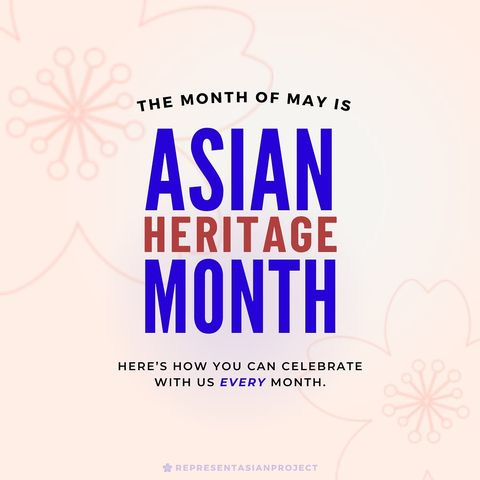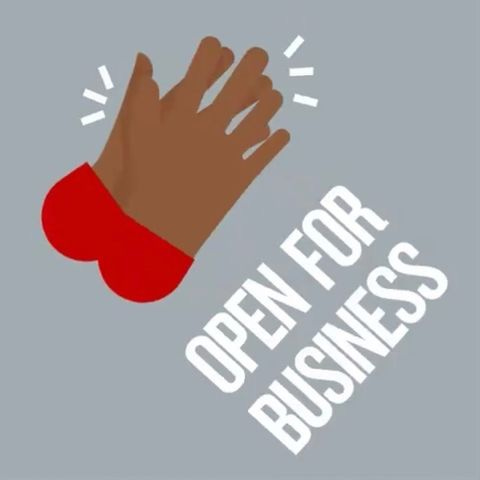Welcome to At The End Of the Day. I’m Hannah Sung and I write this newsletter for a people-first perspective on the news.
It’s been a big week! I launched a Patreon to take this newsletter to the next level. If you want to be part of the growth toward a podcast, click to become a patron. For more info, scroll to bottom.
As you know, I’m obsessed right now with people who are translating the moment -- this eye-opening, transformative, tectonic-plates-are-shifting moment.
That’s why I’m featuring Madelyn Chung today. She is the brains behind The RepresentASIAN Project, an online space for celebrating and amplifying Asian Canadian culture and individuals.
See, this month is Asian Heritage Month. And this year is different because throughout the pandemic, there’s been a surge of anti-Asian racism and violent attacks. It’s heart-breaking to witness elderly people attacked violently in broad daylight.1 This racist chaos was emboldened by Trump at the outset of the pandemic, but Trump didn’t invent racism. It’s always been there, a part of the colonial fabric of our society.2
I describe myself as Korean Canadian. But of course, I’ve used the word “Asian” off-hand, too. It never feels great because I have my issues with the word “Asian,” which might sound funny since it’s a categorizing word that isn’t necessarily bad, per se. Of course it isn’t bad -- an entire continent can’t be wrong.
But that’s the thing -- Asia is an entire continent. How can one word ascribe characteristics to a group of 4.5 billion people? And that’s just people who live there now -- what about a baby born in the diaspora at Mount Sinai hospital on University Ave in Toronto, like sayyy, me?
The issues I have with the word “Asian” were articulated immaculately in a 2017 story by Jay Caspian Kang in the New York Times.
“Asian-American’’ is a mostly meaningless term. Nobody grows up speaking Asian-American, nobody sits down to Asian-American food with their Asian-American parents and nobody goes on pilgrimages back to their motherland of Asian-America.
Discrimination is what really binds Asian-Americans together. 3
The same thing can be said for the words “Indigenous” and “Black” and BIPOC.
We use these words even while they’re imperfect.
And this month being Asian Heritage Month, well, I get it -- it’s an opportunity to have tough conversations that try to address and dismantle the white supremacy in our systems. I’m all about that. But the concept of this month is also a bit annoying, like an insincere apology or a piece of duct tape when what you really want is to throw something in the garbage, light a match and start again.
This is why I love The RepresentASIAN Project. It’s not a reaction to one incident, or one specific month. It is the wildfire brainchild of Madelyn Chung that was a lifetime in the making.
From the time Madelyn was a teen, she wanted to be in fashion journalism. She pursued and built a career for herself but in 2016, was suddenly laid off.
I really went through an existential crisis at that point. Like, what do I do now? What is something I can do that's meaningful with the skills I have? I thought about going into teaching. Then my mom mentioned music therapy.
Music therapy! Maybe not where you thought this conversation was going to go.
Madelyn spent the next few years focusing on a degree in music psychotherapy and did her first placement in 2018. That was the year the movie Crazy Rich Asians came out.
That's when I started to become proud of my Chinese identity. Before that, it was something I always wanted to hide. Frankly, I wanted to be a white person because I grew up in an all-white town and I always felt like an outsider.
When Crazy Rich Asians hit theatres, actors Simu Liu and Andrew Phung hosted a screening, putting the word out on Twitter.
I went and it was just the most amazing experience to be in a room full of Asians celebrating seeing ourselves on the big screen in a positive way. And laughing and crying together, it was just so unbelievable. And I ended up writing a piece for Flare and that was my start into writing about my identity. 4
It resonated with so many people. I was like, wow, this is what I can use my writing for.
One night, Madelyn was seized by the idea to create a website to tell Asian stories and from her bed, on her phone, she bought a domain name and got started. She didn’t sleep that night.
The day her website launched, Covid was declared a global pandemic.
None of us could have known everything that would come out of the pandemic, especially the anti-Asian hate. So what really started off as celebrating, advocating and elevating Asian representation has now evolved into talking about things that Asian Canadian communities care about, educating not only them but allies, as well.
While Madelyn knows pop culture (her day job is creating content at Netflix), she still practices music therapy, which became very relevant after the Atlanta murders when she was tapped to lead an online support and healing space for young Asian women.
That was like, Okay, here's where my two worlds collide. Doing that group was one of the most amazing things I've ever done. The conversation it sparked and the support everyone was giving to each other was so beautiful. How often are you in a room of Asian women and gender-diverse folks being able to talk about this? I've never had that before in my life, you know?
These various types of work may seem disparate but there is a deep connection and motivation for Madelyn to get it done.
Where everything intersects is me wanting to help others feel seen, heard and validated. Whether that's through my writing, The RepresentASIAN Project or in my therapy work.
As Madelyn and I talked, it reminded me of a recent call with my friend Sarah, who pep-talked me with a memory of an event we attended, pre-Covid. A star panel of Indigenous women were talking about storytelling.
Journalist Tanya Talaga spoke about bringing together advocacy and journalism, taking down the idea that they’re mutually exclusive. When Tanya connected with her drive to do both of these things, she could be exactly who she was meant to be. “I’m professionally me,” she said.
That’s what I see in Madelyn’s work. too. Madelyn’s work enlightens me and emboldens me to use my own voice which is a pretty great ripple effect, if you ask me. Thank you, Madelyn.
And on that note of community-building, I want to give a giant shout-out to the ATEOD readers who are taking us to the next level.
Last week, I launched a Patreon to 1) create a podcast and 2) continue to pay the small but growing team of people who make this newsletter happen.
Thank you to new patrons Katie, Liz, Ann, Miranda, Imran, Aliza, Jeny, Sarah B, Karen, Jordan, Avery and Adjoa! And to the first ten to take the plunge, big fist bump to you!
ICYMI
Here are a few previous ATEOD links relevant to today’s newsletter:
⭐ Light at the end of the tunnel Interview with Madeleine Mant, on how blame and shame get used in every epidemic
🗞️ You’ll need more than news My reaction to the Atlanta murders with context on the construction of stereotypes about Asian women
🥘 This Korean TikTok is a game changer My Q&A with Joanne Molinaro, or The Korean Vegan, who epitomizes being “professionally” herself
Thank you for reading and come visit me on Instagram to tell me what you listen to. I need new music.
Take care out there,
Hannah
✨✨✨ At The End Of the Day is edited by Ishani Nath ✨✨✨
Further Reading
Why Mother’s Day is a sham — and how we can do better, by Nam Kiwanuka
How Humanity Gave Itself an Extra Life, New York Times. “Science mattered — but so did activism.”
The Mimifesto — a newsletter by Miranda Hill. Honoured to be included in your letter this week, Miranda!
Support COVID-19 Relief Efforts in India
History shows racism has always been a part of Vancouver real estate, The Georgia Straight, 2016
What a Fraternity Hazing Death Revealed About the Painful Search for an Asian-American Identity, New York Times magazine
“Crazy Rich Asians Isn’t Just a Movie—It’s a Sign That I Matter, Too” Flare
Another reason why it’s been a big week — my friends and I are launching a podcast production company! We’re called Media Girlfriends. In the past, we’ve done events and grown an annual scholarship. Now, we’re now connecting with organizations, brands and businesses who want to tell their story through audio journalism and storytelling. Let us make you a podcast. Check us out!







